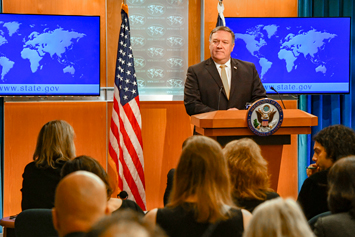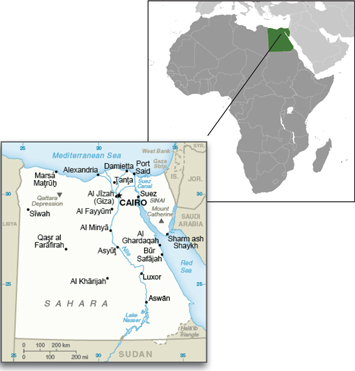Egypt’s military backed government rules and dissenting voices are at an all-time low
By Jehron Muhammad | Last updated: Oct 30, 2018 - 1:50:02 PMWhat's your opinion on this article?

|
Economist and writer Abdel-Khaleq Farouq and his publisher, Ibrahim el-Khateib, were detained, said attorney Mohammed Abdel-Aziz, who represents that author. Egyptian authorities seized 185 copies of an initial 200-copy run, which hadn’t been distributed.

Secretary of State Mike Pompeo Photo: U.S. State Dept photos
|
The book, according to published reports, contains scathing criticism of el-Sissi’s economic policies and blames the general-turned-president for lacking the vision needed to remedy Egypt’s economic woes.
In the book’s introduction, the author says el-Sissi’s assertion on Egypt’s poverty “exposed blatant ignorance of the realistic and untapped capabilities in Egypt’s economy and society and the lack of vision capable of exploiting these abilities and potential.”
In 2013, as defense minister, el-Sissi led a coup against the democratically elected government of President Mohamed Morsi. He was voted in for a second term in March. Critics described his victory as “a theatrical performance, staged by the regime to contrive a popular mandate for strongman President Abdel Fatal el-Sissi’s second term.”
According to Foreign Affairs magazine, thousands were locked up on trumped up politicized or fabricated charges during the election. “Civil society organizations are hounded by the police, and the regime has been buying up privately held media organizations and punishing those outlets that dare to diverge from the state’s Orwellian narrative,” reported Foreign Affairs magazine.
During the presidential campaign, former military chief of staff Sami Anan announced that he would run for president. Anan, who was apparently among those who el-Sissi warned against trying to “come near this chair,” was arrested.
A statement attributed to the military and read on state television accused Anan of violating regulations by attempting to run for election without prior permission from the army. He is also accused of “incitement against the armed forces with the aim of creating a rift” between the army and the Egyptian people.
Egypt’s military is el-Sissi’s principal backer and a Egyptian mainstay in “civilian activities.”

|
Many military-owned private industry companies have flourished under the el-Sissi regime, reports Reuters. The military owns 51 percent (controlling interest) in a firm developing a new $45 billion capital city to the east of Cairo. “Another military-owned company is building Egypt’s biggest cement plant. Other business interests range from fish farms to holiday resorts,” said Reuters.
The president says the military can deliver large, complicated projects faster than the private sector. In fact, in 2016, the military and other security institutions were given exemptions under a new value added tax (VAT) law enacted as part of International Monetary Fund-sponsored reforms. The military doesn’t have to pay such taxes on goods and equipment, machinery, services and raw materials needed for the purposes of armament, defense and national security. The Ministry of Defense gets to decide which “goods and services qualify.”
The Reuters’ report notes private sector hotels pay a 14 percent VAT on a cup of coffee. At the military-owned Al-Masah Hotel in Cairo, there are no VAT charges, including when renting venues for weddings and conferences.
The Ministry of Military Production does not disclose what happens to its revenues. The chairman of two of its firms says profits go to the ministry or are reinvested in the businesses.
Outrage can be heard from Hazem Hosny, a political scientist and economist at Cairo University and a spokesman for Sami Anan who sought to run in this past presidential election. Anan was reported languishing in a hospital in late September.
“We have reached a point where they (military) are competing even with street vendors,” Hosny said.
Then there is the ongoing clamp down, where Egypt’s parliament has voted to extend a state of emergency in the country for three months, prolonging the authorities’ ability to take special measures. This gives them sweeping powers, including making arrest and cracking down on what they call enemies of the state.
Then, the country is over halfway into a three-year $12 billion IMF loan program it signed in 2016, which is tied to oppressive austerity measures, including tax hikes and subsidy cuts. All this was done to lure back foreign investors and kick-start a rocky economy that crashed after the 2011 Arab Spring uprising.
One blogger, in a piece titled, “Will Egypt have another uprising,” suggests with el-Sisi’s firm grip on the government and backing of the military, another uprising like the street protests of 2011 “is unlikely in the near term.” With nearly 2,000 Egyptians “disappearing” in 2015, an unofficial security policy of el-Sisi’s military government, you don’t need to think hard on the reasons why, say observers.
With the heavy-handed regime, its extensive media campaign to shape public perceptions and rising penalties associated with dissent “the security forces … target potential opponents with impunity, it’s no wonder dissenting voices in Egypt, at least those we can hear, are at an all time low,” the blogger said.
“Democratic lawmakers are urging the Donald Trump administration to leverage its $1.3 billion military relationship with Egypt as the U.S. ally cracks down on human rights,” reported Al-Monitor.com on Oct. 25. “In a letter obtained by Al-Monitor, Sens. Chris Coons, D-Del., Patrick Leahy, D-Vt., Jeff Merkley, D-Ore., and Chris Van Hollen, D-Md., told Secretary of State Mike Pompeo they were ‘disappointed’ by his August decision to waive rights conditions tied to nearly $200 million in U.S. weapons assistance to Egypt. They worry Egypt will see the State Department’s waiver as a rubber stamp for attacks on civil liberties, including a new law that further restricts the activity of nongovernmental organizations.
“ ‘Our fear is that the Egyptian government will perceive your decision to release this funding as an endorsement of, or acquiescence in, its repressive policies,’ ” the senators wrote to Pompeo, according to the Middle East news website. “We are also concerned that President [Abdel Fattah] al-Sissi will view your decision as further evidence that Egypt can wait out any future attempts by the U.S. government to apply pressure,” Al-Monitor.com said.
Follow @jehronmuhammad on Twitter.com.
INSIDE STORIES AND REVIEWS
-
-
About Harriett ... and the Negro Hollywood Road Show
By Rabiah Muhammad, Guest Columnist » Full Story -
Skepticism greets Jay-Z, NFL talk of inspiring change
By Bryan 18X Crawford and Richard B. Muhammad The Final Call Newspaper @TheFinalCall » Full Story -
The painful problem of Black girls and suicide
By Charlene Muhammad -National Correspondent- » Full Story -
Exploitation of Innocence - Report: Perceptions, policies hurting Black girls
By Charlene Muhammad -National Correspondent- » Full Story -
Big Ballin: Big ideas fuel a father’s Big Baller Brand and brash business sense
By Bryan Crawford -Contributing Writer- » Full Story






 Click Here Stay Connected!
Click Here Stay Connected!








